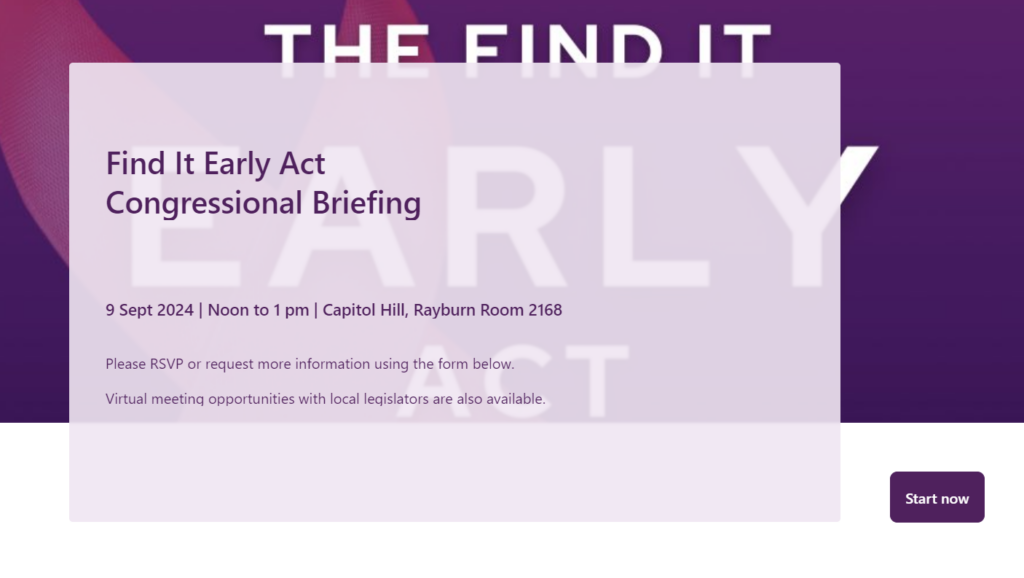Despite advances in technology and increased awareness, women are still dying from breast cancer—many deaths that could be prevented. Volpara is at the forefront of this battle, leading efforts to ensure that every woman has access to critical information and screenings.
Volpara has led the charge to increase Congressional support for universal coverage for breast screenings beyond mammograms. On September 9th, we will have the opportunity to let our voices run through the halls of Congress during a briefing and then an advocacy day. Volpara has collaborated with other advocates and with Congresswoman DeLauro (D-CT) to increase support for the Find It Early Act. But we can’t do this alone—we need you more now than ever.
The Find It Early Act is a simple, critical piece of legislation. In short, the bill would guarantee full insurance coverage for women to get the lifesaving screenings that they need and deserve – regardless of whether they have commercial or public insurance. This bill targets women at higher risk of breast cancer, such as those with dense breast tissue.
This effort began at the state level, championed by advocates like Nancy Capello. Her story is a stark reminder of the gaps in our current system. Just weeks after her clean mammogram, Nancy was diagnosed with stage three breast cancer. Her dense tissue hid the lurking—and ultimately fatal—breast cancer.
She turned her fate into a 14-year battle to ensure that every state across the country had to inform women about dense tissue. Unfortunately, she lost her battle with breast cancer, but she started a powerful, lifesaving movement. Her determination to prevent others from facing the same fate led to a recent, federal law that requires every woman to be told of her breast density. This law goes into effect on September 10, 2024—the day after our Congressional briefing.
However, despite this step in the right direction, many insurance carriers still don’t cover critical screenings beyond mammograms. The Find It Early Act would ensure that women don’t just have information but also have access to the lifesaving screenings they need and deserve by mandating that public and commercial insurance cover screenings beyond mammograms for free, just as mammograms are covered under the ACA.
Despite the clear need and bipartisan support in the House, we have been unable to secure a Republican co-sponsor in the Senate. The resistance is often rooted in the broader philosophical debate about federal versus state mandates and spending more federal dollars.
Volpara has been instrumental in pushing for this change, not just through technology and services but also at the policy level. We’ve worked alongside a coalition of nonprofits, medical centers, patients, and other stakeholders to drive this initiative forward.
The hearing on September 9th is a critical moment in this fight. The briefing, which is the day before the federal density notification rule takes effect, is a chance to lobby in person, put faces to the statistics, and remind our lawmakers that breast cancer does not pay attention to politics.
Your presence at the hearing will make a difference. Join us on September 9—together, we can help ensure that every woman, regardless of socioeconomic background, has access to life-saving screenings.
Hearing details:
- When: Monday, September 9, from noon – 1 p.m. ET
- Where? Capitol Hill, Rayburn Room 2168
- Why attend? Make your voice heard so lawmakers understand how critical it is to support – and pass – the Find It Early Act
- RSVP or register here for more information; including virtual opportunities to meet with legislators
Quick facts:
- Almost 50% of women in the U.S. have dense breast tissue
- Women with dense breasts may be 4-6x more likely to get breast cancer
- Mammograms are only ~56.1% effective in dense tissue
- Mammograms, in combination with other essential screenings, such as ultrasound or MRI, increase the detection of cancer in dense tissue by 25-56%


